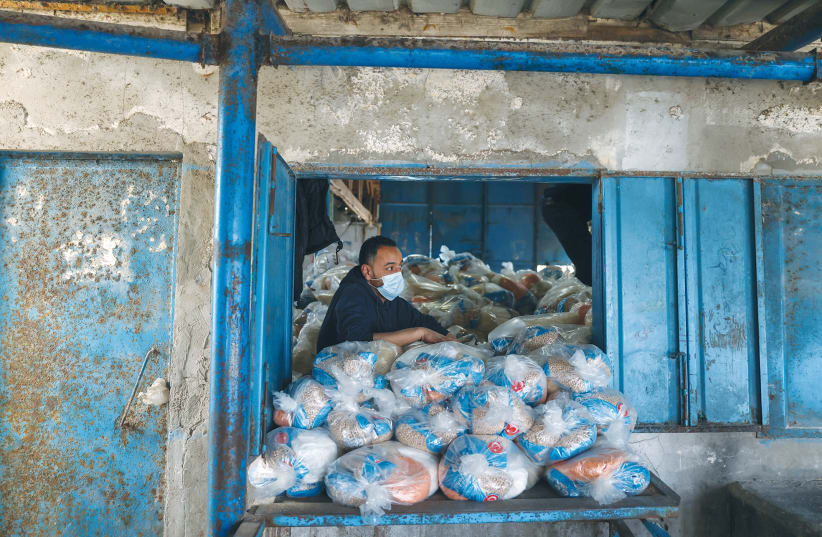Some 55% of Hamas’s budget is allocated for its military “needs,” while less than 5% goes to improving the Gaza standard of living, and international organizations’ aid comprises 65% of the total investment in the Gaza Strip. Hamas senior political leader Ismael Haniyeh recently racked up a bill of over $1 million at the Mandarin Oriental in Doha, a five-star hotel. Meanwhile, the war that Hamas had planned, beginning May 9, led to the deaths of hundreds of their own people, as Haneyeh preached to the world – fairly successfully – about how poor the Palestinians are.
Hamas is infamous for its exploitation of international aid. In 2018, Hamas refused Israeli medical aid, despite hospitals suffering shortages. They even set conditions for receiving Israeli aid. Rather than using the 3.5 million tons of construction material that entered Gaza just in 2016, for example, to build schools or apartments, a substantial amount is diverted to create more tunnels through which its militants can illegally enter Israel. In 2009, the United Nations temporarily stopped sending aid to Gaza because Hamas siphoned off 200 metric tons of rice, 100 metric tons of flour, 3,500 blankets and 400 food parcels that were meant to go to its populace.
Simply diverting aid shipped to them does not seem to be enough for Hamas; they have also actively sought out aid meant for peaceful purposes. In August 2016, Palestinian UN employee Waheed Borsh “was charged with diverting 300 tons of rubble from a UNDP project in the Gaza Strip... to build a jetty for the Islamist movement’s naval force” and sentenced to seven months in prison.
Worse, Hamas has close ties to the United Nations Relief and Works Agency for Palestine Refugees in the Near East (UNRWA), which is supposed to assist with development in Gaza. And it’s no longer subtle. In a recent statement, UNRWA Deputy Commissioner-General Lenny Steinseth thanked Hamas leader Yahya Sinwar for his “desire to continue cooperation.”
Tunnels used by Hamas to smuggle weapons were discovered this week and in 2017 beneath UNRWA schools. In 2014, Hamas’s rockets were discovered in UNRWA schools at least three times. These incidents are virtually impossible without some coordination between Hamas and the UN agency.
Plenty of UNRWA employees are also beneficiaries of the agency and attended UNRWA schools growing up, where hate is preached and Hamas is likely promoted. According to an EU study of 156 textbooks and 16 curricula, UNRWA textbooks still promote violent antisemitism. Students brainwashed by this message grow up to work at UNRWA, and the vicious cycle continues.
Even the US State Department can’t guarantee that aid won’t go to Hamas, offering only vague assurances that they’re “going to do everything that we can to ensure that this assistance reaches the people who need it the most.”
INSTEAD OF allowing Hamas to regulate itself, which is, in essence, no regulations at all, an ad hoc body run by Egypt – which borders Gaza – or the UAE, should be created to distribute all international aid. It is crucial that the body be ad hoc with ever-changing members so that Hamas won’t be able to infiltrate it, as they did with the UNDP.
This body, which should also include several Gaza residents, should receive all international aid meant for Gaza and ensure that it goes directly to recipients, including schools, hospitals and construction companies. All countries who contribute aid to Gaza via this ad hoc body should have an interest in holding it accountable for ensuring their aid is correctly designated, and withdraw aid accordingly if it is not.
Nothing in Gaza is safe from Hamas’s influence. Not schools, not American news outlet headquarters and not even hospitals. International aid to the victims of the recent war sounds righteous, but it often causes more harm than good when it allows Hamas to restock weapons. UNRWA, the obvious body to take charge, has been heavily influenced by Hamas for years, leading to essentially zero monitoring of hundreds of millions of dollars.
Several countries including the US, Germany, Egypt and Qatar and the EU have pledged to send aid and due to a lack of coordination, resulted in a pledged $1.4 billion, despite estimates placing damage in Gaza around $322 million. This further incentivizes Hamas to start wars during which they know Israel will retaliate.
If the international community truly wants to aid Gaza residents, purging Hamas’s influence and completely restructuring UNRWA would be far more effective than money or concrete.
Naomi Grant is the director of communications at the Endowment for Middle East Truth (EMET).
